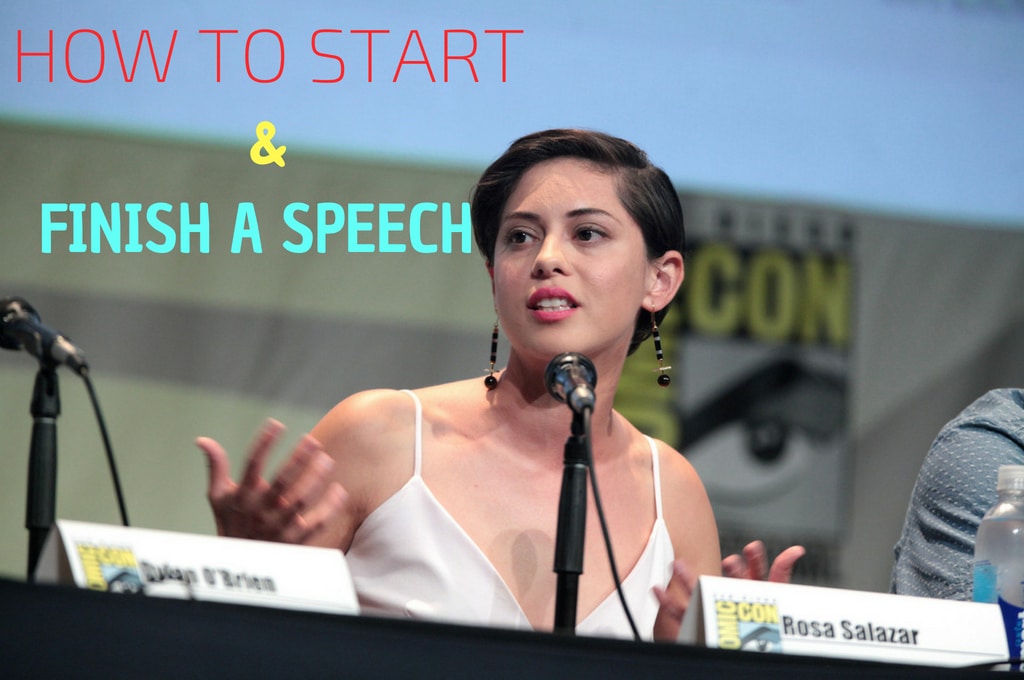Imagine yourself standing on a podium where you need to give a speech in front of hundreds of people. Your heart is racing, palms are sweaty and you are not sure how, to begin with, or start a speech.
There might be a hundred thoughts running through your mind, about what people are thinking or how they will respond. This all will add to your nervousness and you may struggle to begin with.
 Image credits: Flickr
Image credits: Flickr
This is how generally most of the people feel when giving the speech, this can be challenging for many of the experienced speakers too.
The moment you are walking on the stage, the audience has already built an opinion about you, it is a matter of your own words how true or false you can be, to their opinions.
Suppose, another scenario, where you started speaking but over the course of your speech, you see your audience dozing off or losing their attention.
You have worked so hard to get that perfect speech, yet you see the lack of interest in your audience. What could have possibly gone wrong?
This is why to save yourself from such situations, it is good to prepare for your speech before your final day.
Plan, prepare and practice are keys to a successful speech delivery to your audience.
How to Start a Speech of Introduction?
The start and the finish of your speech are equally important because this is what will determine your success with the audience reaction. Don’t forget to pay attention to the minor details, which we will discuss further.
Know your audience, when starting a speech:
Before you know how to start with your speech, it is important to understand the general expectation of the audience.
- What they are looking for?
- What will be their expectation?
You need not go to the micro-level but some basic idea will be helpful.
For example, your audience might be expecting to gain something new insight from you.
This knowledge can be easily attained and understood by arriving a bit early before you begin your speech. Meet a few people from the audience, talk to them, know what made them come to listen to you.
Familiarize with space and the crowd, observe how people are responding to other speakers if there are any, what other speakers said that got the audience interest or how they reacted to a certain phrase.
Some basic audience understanding will help you to get a better picture for your own speech.
You can ensure to take some important measures for preparing to start your speech.
Be your self:
Once you understand your audience thoroughly, the next step is to be comfortable and walk on the stage with confidence.
Chances are high you might be feeling nervous, depending on your prior experiences with speech.
Don’t forget to smile, it is a powerful form to connect with someone or a larger group without even you were to speak. Smiling also helps to manage your nervousness before you speak.
Have a positive body language while walking towards the stage, this will motivate you and help in gaining the trust of your audience to listen to you.
Some people have the habit of fidgeting while giving a speech, be comfortable and prevent such actions while giving your speech.
Even before you start with your speech, take a few minutes to adjust your mike, stand in a comfortable position, take a deep breath and relax.
Also, don’t forget to make eye contact with your audience before beginning, find a few faces that you can connect with, this will add your confidence level.
Practice and prepare before the final speech:
The point of practicing before your final speech will prepare you for the final day without any mishaps.
As a speaker, it is important to know your topic and event, making it easy to prepare well before time. For example, is your event or topic political, scientific, or social based.
The context of your topic will be helpful for your audience to connect well with the event that they came for.
Connecting with your audience:
Let your speech be more of a conversation with your audience, they may not be responding to your verbally, but do give them some space between your sentences to think over your words.
For example, take small pauses between your impactful lines, allow your audience to respond to it if they want to clap or are simply chuckling on something you said.
Pay close attention that you don’t keep quiet for a longer duration. The timing of your pause matters because this is what will leave an impact on your audience.
Start your speech with positive words, it is advisable to prevent using any negating words.
Don’t forget to build a connection with your audience on a personal level, for example, incorporate using the terms of “you” and “I” when communicating something important.
Are you someone who is fond of using fancy words and jargons?
A word of advice, while giving a speech keep it simple and straight to the context. Let not your audience go looking for a dictionary to understand what you are saying.
Keeping your audience interested in you and your words is very important because it is quite easy for a larger audience to lose interest in what you have to say.
So it is important to break the monotony from time to time by adding some quirky lines and jokes to grab their attention and bring them back to the main topic.
Be an observant person, see how your audience is reacting if you see they are losing interest, try to incorporate some light-hearted joke to grab their attention.
Some in-between tricks and tips:
If you think you may forget what you have to say, then make small notes of what all you will be talking about. Keep a check from time to time that you are on the track and not losing the focus on the topic.
Rehearse before your final speech day, keep it with a timer, this will give you a fair idea if you need to cut short your speech or need to make some changes.
Get your speech checked with few people to know and check if the grammar and language are good or any suggested changes that may come from them.
It is good to practice your speech in front of the mirror or in front of a few of your friends and colleague, this will come in handy and you won’t be nervous that day.
After a good start of your speech, finishing your speech with power is extremely important.
Famous Quotes to Start a Speech:
- The common question that gets asked in business is, ‘why?’ That’s a good question, but an equally valid question is, ‘why not?’. – Jeff Bezos
- There are lots of bad reasons to start a company. But there’s only one good, legitimate reason, and I think you know what it is: it’s to change the world. – Phil Libin
- A business that makes nothing but money is a poor business. – Henry Ford
- If you are not embarrassed by the first version of your product, you’ve launched too late. – Reid Hoffman
- If everything seems under control, you’re not going fast enough. – Mario Andretti
- A man who wants to lead the orchestra must turn his back on the crowd. – Max Lucado
- Your work is going to fill a large part of your life, and the only way to be truly satisfied is to do what you believe is great work. And the only way to do great work is to love what you do. – Steve Jobs
- The man who moves a mountain begins by carrying away small stones. – Confucius
- The difference between successful people and really successful people is that really successful people say no to almost everything. – Warren Buffett
- Don’t be satisfied with stories, how things have gone with others. Unfold your own myth. – Rumi
- You don’t have to be a genius or a visionary or even a college graduate to be successful. You just need a framework and a dream. – Michael Dell
- Build something 100 people love, not something 1 million people kind of like. – Brian Chesky
- The two most important days in your life are the day you are born and the day you find out why. – Mark Twain
- The successful warrior is the average man, with laser-like focus. – Bruce Lee
- Try not to become a man of success, but rather try to become a man of value. – Albert Einstein
- If something is important enough, even if the odds are against you, you should still do it. – Elon Musk
- In the midst of movement and chaos, keep stillness inside of you. – Deepak Chopra
- Many of life’s failures are people who did not realize how close they were to success when they gave up. – Thomas Edison
- Fall seven times and stand up eight. – Japanese Proverb
- I was taught the way of progress is neither swift nor easy. – Marie Curie
- Think twice before you speak, because your words and influence will plant the seed of either success or failure in the mind of another. – Napoleon Hill
How to Finish a Speech?
Don’t be in a rush to finish your speech, you have had a great start, your audience is loving you and this is the time when a final impression needs to be made on your audience.
Finishing should be impactful and a bit of thought-provoking. Rather than saying just plain simple thank you, give your shot to end it with power.
Planning how you intend to finish your speech will give good clarity, just like you did from the start, again, don’t forget to practice ending your speech too.
Here is a video on how to end a speech with impact:
What would you like to say for a powerful ending?
Your ending can be filled with emotions, where you can share some heart touching story as a closure. Or you can make it inspirational, by using powerful quotes and messages.
All in all, it depends on the content and context of your speech. But adding some value to the finishing will make your audience remember you.
Invite your audience to join you in your vision on a personal level. It is ok if your audience agrees or even disagrees with your point of view, but do stir your audience emotions to think about your speech.
Be optimistic about your finishing, avoid jargons, sarcasm or negativity of any sort in your speech. Optimism is infectious, and that is what will drive your audience to believe in you.
Share your own personal motivating story and how your experiences helped in changing your views or ideas about something. But remember not to go out of the context of your topic.
Connecting Back the Dots to the Start:
People have a short span of memory, many would have already forgotten what you said in the beginning by the time you are finishing.
Refer back to the opening of your speech, mention the beginning of your speech, which will make the audience connect with what you said initially and will be able to connect with the ending.
Add a quick summary of your speech, making it easier to conclude your words in a simple way, you can say something along the lines, Allow me to briefly say from where I begin with…
Tell your audience a story, paint a verbal picture that they can imagine, explain why this story is important and how it connects with your topic easily.
Allow your audience to have some take away from your speech, rather than left for themselves to figure out the meaning, explain the moral of the story and why it is meaningful.
Final Touches on Finishing your Speech:
While ending your speech, make a strong statement of your topic, rather than question your audience and leaving them confused for the answer.
When you are already aware of the power of your speech, then take advantage of it and make your own powerful statement about the subject for the audience to linger upon to think.
Sprinkle some humor in your speech, make your audience laugh with a joke which is of relevance to your speech, draw their attention towards you before you leave the podium.
You can sum up your inspiration with the problems arising, challenges faced, setbacks, failures and how one does overcome them.
Make your ideas resonate with your audience before you leave the stage, let it echo into their minds for some more time.
Last but not least, remember to appreciate your audience for listening to you patiently and intently, sharing their time from the busy schedule to be present at your speech.
Explain why their presence meant so much to you and how important was it for you. You can start by saying, I thank you all for taking the time to be here…
Time for Final Acknowledgment:
Once your speech is done, the audience will applaud you as a way of thanking you back and appreciating your valuable words with them.
Let your audience get the idea as to when you have concluded your speech and now is the time for them to applaud.
Look into the eyes of few people from the audience and thank them again. Stay at the podium for a minute or two, as an acknowledgment of their applause.
Experience the echo of their applause a smile before moving out of the stage.
Speak with your heart, have the power of conviction in your words, it will make your audience listen to you intently. Build a relationship with them with your words, leave an impact on their minds.
Keep Practicing, Keep Improving:
To become a good speaker takes a lot of time and perseverance, remember that you take some learning from each of your experience, practice regularly, observe what works for you and what needs improvement.
Try to take quick notes, after every speech, so that you don’t forget what all you observed and how you can improve, otherwise, you may end up making the same mistakes everywhere.
After the end of the speech, stay back and talk to a few of the people from the audience. Know from them what they liked about your speech, which part of it was with which they connected.
This feedback will go in the long run for you to develop a better understanding of your audience and will make you a better speaker.











































